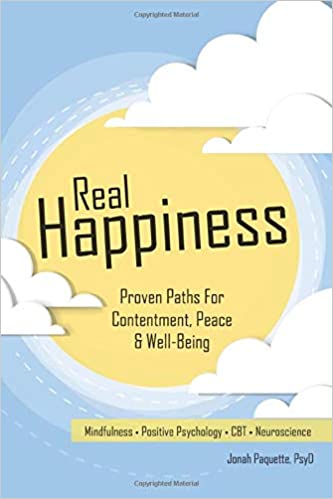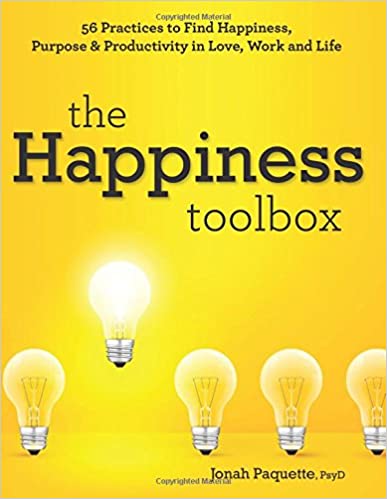Hi,
Loving yourself can be one of the hardest things to do. Why is that? We can be our worst enemies at the flip of a switch. I know for me, if something doesn’t go as I planned or hoped, I am quick to point the finger at myself. It must have been something I did or said. I should’ve handled the situation differently. No. Stop. We HAVE to be our biggest cheerleaders. That phrase people say is 100% true…”treat yourself like you would treat your best friend.” We have to emotionally be there for ourselves especially in times like these where there is so much uncertainty. It is imperative for our mental health.
Jonah Paquette, PsyD, is here to share the importance of self-love. Dr. Paquette is a licensed clinical psychologist, speaker, and author. As a psychologist for Kaiser Permanente in the San Francisco Bay Area, he conducts group and individual psychotherapy, performs crisis evaluations, and oversees the mental health training programs across four medical centers. In addition to his clinical work and writing, Jonah offers training and consultation to therapists and organizations on the promotion of happiness and conducts professional workshops both nationally and internationally.
I hope you find his words helpful.
xo,
Whit
Being There For Yourself: How Self-Compassion Helps Us Cope with Uncertainty
How do you respond when someone you care about is struggling? What kind of words, tone of voice, or actions do you take to support them? Take a moment and imagine this sort of situation if it helps, and visualize how you tend to show caring, love, and compassion towards others in this way. Got it? Ok, now imagine the reverse is happening – that you’re the one who’s fallen down, and you’re the one suffering. How do you tend to talk to yourself? What sorts of words, tone of voice, or actions do you take when you’re the one struggling? Now…is there a difference between the two?
If you’re like most people, it might feel easier to be kind towards other people than towards yourself. In fact, studies have shown that over 80% of people struggle more with self-criticism – they beat themselves up, talk to themselves in ways they would never speak to others, and engage in self-destructive behaviors rather than supportive ones. This tendency to be self-critical is bad enough under “normal” circumstances – just think of all the stress hormones like cortisol and adrenaline pumping through our body, and even how it feels inside of our body when we’re beating ourselves up in this way. But it’s even worse when we’re facing a challenging situation like we find ourselves in now, trying to cope with the many elements of COVID-19.
Many of us who struggle with self-criticism undoubtedly notice that during stressful times, our inner critic becomes that much louder. As we struggle with our own reactions to COVID-19, we compound our stress by questioning why we aren’t handling things better, why we can’t keep it together, or why we’re struggling the way that we are. “I should be stronger than this,” we tell ourselves. “Others are worse off than me,” we might say, “what am I complaining about?”
While this sort of self-criticism is tragically all too common, some of the unfortunate effects of high levels of self-criticism include increased rates of depression, heightened anxiety and stress, and even worsening physical health. So what’s the answer? Self-compassion. The ability to treat ourselves with the same degree of caring, kindness, and compassion that we all deserve. This concept isn’t exactly “new” – in fact, Buddhist philosophy has highlighted the importance of compassion towards ourselves for thousands of years. But in the last few years we’ve begun to uncover just how crucial of a skill this is for all of us, and the ways in which self-compassion can improve our mind and body.
On a basic level self-compassion means treating ourselves with kindness, the way we would treat someone else. But researchers who study self-compassion for a living, like psychologist Kristin Neff, take things a step further and define self-compassion as a combination of three separate but interconnected ingredients:
- Mindful Awareness: The ability to notice and experience our feelings, thoughts, and reactions – without trying to minimize or push away our pain nor amplifying or exaggerating it.
- Common Humanity: The recognition that all human beings suffer, and that we’re all in this together. So rather than feeling alone in our pain or that others can’t relate to what we’re going through, we can feel reminded that whatever we’re going through is simply part of being human.
- Self-Kindness: Being gentle with ourselves, using compassionate self-talk, and engaging in actions that are caring and nurturing.
Remarkably, the practice of self-compassion has been linked to a wide of benefits, including lower rates of depression and anxiety, improved recovery from trauma, decreased chronic pain, and even better overall health. While it’s an important skill to develop under any circumstance, it’s especially key during times of uncertainty and unpredictability like we find ourselves in right now with COVID-19. By being kinder towards ourselves, we can respond to the challenges around us with greater skill and effectiveness. And by learning to be more compassionate towards ourselves, we’re actually more able to be there for the people who count on us – indeed, we have to care for ourselves before we care for others. So how do we do it? In the days ahead, try incorporating some of these simple practices into your life to tap into the powerful benefits of self-compassion:
- Checking in with yourself: During stressful times, it can be easy to simply put our head down and keep going. But it’s also important to balance this tendency by giving ourselves space to feel whatever it is that we’re feeling, and to honor that experience. Notice what you’re going through, without judgment, and let those feelings in.
- What do I need right now? Whether it’s a self-affirmation, a favorite comfort food, a luxurious bubble bath, or a walk in nature – asking ourselves what we need during times of stress can help us to calm down and bring ourselves back to baseline.
- How would I treat someone I love? While it’s common to treat others with greater patience and understanding than we do ourselves, I invite you to spend some time in the coming weeks seeing if we can turn those tables just a bit. The next time you catch yourself beating yourself up or being hard on yourself, ask yourself how you might respond to someone you care about going through the exact same thing that you’re going through. And then see if you can apply that to yourself.
- Soothing Touch: A gentle soothing touch, even towards ourselves, can help activate our parasympathetic nervous system (the relaxation response) and our mammalian care system. When you’re struggling, try experimenting with different ways of engaging in compassionate touch – this could be placing your hands over your abdomen, gently placing a hand (or both) over your heart, crossing your arms and giving a squeeze – whatever feels safe and soothing.
- A Compassionate Letter: You might try writing a letter to yourself, written from the perspective of someone who you feel loved and supported by. Think about how this person is there for you, the words they use, their tone of voice, and the actions they might take. What might they say to do during a time that you’re struggling?
- Remind yourself that you’re not alone: While stress and uncertainty can make us feel alone, it’s important to remind ourselves that we are all in this together. Our stories might be different and our specific circumstances might be unique, but the fears and apprehensions that we’re going through right now are universal. Remember that others are going through this too, and reach out for support wherever you’re able to.
——–
If you found his words helpful, check out his books below!









